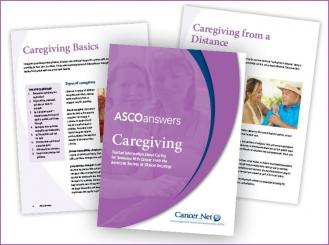Oct 15, 2015
While patients with cancer often have many questions for health care professionals, patients’ caregivers may also need help understanding how they can best support their family member or friend. Cancer.Net’s Caregiving booklet, the latest addition to its ASCO Answers collection of resources, seeks to help caregivers better understand their role and navigate difficult situations.
In Caregiving, those who provide care for someone with cancer can learn what it means to be a caregiver. This includes a discussion of the basics of caregiving, the types of caregivers, the tasks for which caregivers may be responsible, and tips for providing care.
Additionally, this booklet provides an in-depth discussion of the medical and nonmedical tasks caregivers may take on, whether they are providing in-home care, long-distance care, or care in the hospital. The booklet also contains information to help caregivers navigate and understand health insurance, advance directives, health care proxies, the Family Medical Leave Act, and financial challenges.
An important and valuable component of this new booklet is the worksheets found in each section. Caregivers can use these worksheets to plan and manage care for the person with cancer as well as their own self-care. Worksheets include:
- Determining caregiving needs, such as how much the person they care for is able to do on their own or with help
- Making a bag that is readily available and contains all that is needed for planned and unplanned visits to the doctor or hospital
- Creating a list of important information for each appointment
- Keeping a record of medications, symptoms, and side effects
- Organizing volunteers, with space to include names and the tasks each volunteer is responsible for
- Creating a plan to help manage stress for the caregiver
ASCO Answers materials combine oncologist-approved information, a conversational tone, and reassuring look and feel to provide the tools and resources for people affected by cancer to become active participants in their care.

